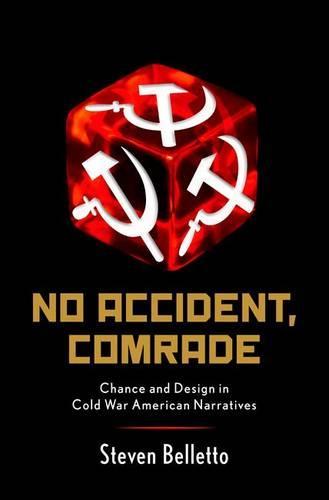Overview
"No Accident, Comrade argues that chance became a complex yet conflicted cultural signifier during the Cold War, when a range of thinkers--politicians, novelists, historians, biologists, sociologists, and others--contended that totalitarianism denied the very existence and operation of chance in the world. They claimed that the USSR perpetrated a vast fiction on its population, a fiction amplified by the Soviet view that there is no such thing as chance or accident, only manifestations of historical law (hence the popular American refrain used to refer to Marxism: ""It was no accident, Comrade"").By reading an expansive range of American novels published between 1947-2005, alongside nonfiction texts by the likes of Jerzy Kosinski, Daniel Bell, Ian Hacking, and mid-century game theorists, No Accident, Comrade explains how associations of chance with democratic freedom and the denial of chance with totalitarianism circulated in Cold War America. Chance became tied to the liberties of U.S. democracy, whereas its eradication or denial became symptomatic of Soviet tyranny. With works by Nabokov, Ellison, Pynchon, Didion, DeLillo, Colson Whitehead, and many others, Steven Belletto shows how writers developed innovative strategies for dealing with and incorporating these ever-present beliefs about chance and its role in their culture. These newly developed narrative techniques allowed them to theorize, satirize, and make sense of the constantly changing relationship between the individual and the state during a largely rhetorical conflict."
Full Product Details
Author: Steven Belletto (Assistant Professor of English, Assistant Professor of English, Lafayette College)
Publisher: Oxford University Press Inc
Imprint: Oxford University Press Inc
Dimensions:
Width: 23.90cm
, Height: 2.30cm
, Length: 16.00cm
Weight: 0.431kg
ISBN: 9780199826889
ISBN 10: 0199826889
Pages: 224
Publication Date: 19 January 2012
Audience:
College/higher education
,
Professional and scholarly
,
Undergraduate
,
Postgraduate, Research & Scholarly
Format: Hardback
Publisher's Status: Active
Availability: To order

Stock availability from the supplier is unknown. We will order it for you and ship this item to you once it is received by us.
Reviews
<br> This is an original and accomplished piece of scholarship that will make a significant contribution to the cultural history of the Cold War in the U.S. and to the literary history of the American novel. --Sean McCann, author of A Pinnacle of Feeling<p><br> Take the volatile intersection of ambitious literary forays and the historical import of the Cold War. Add a scholar of keen intelligence who has read widely and who can make intriguing connections. The result is a book replete with fresh and striking insights into the perennial problem of freedom and fate. And that's no accident. --Stephen Whitfield, author of The Culture of the Cold War<p><br> This is a valuable addition to Cold War studies, and a fresh account of the relationship between narrative and the accidental during the second half of the twentieth century. The analysis is smart and wide ranging, and offers new ways of understanding how and why the period's geopolitical conflict mattered to literature. --Michael Szalay, author of Hip Figures: A Literary History of the Democratic Party<p><br> No Accident, Comrade brilliantly demonstrates how the literary expression of chance became a powerful counter-trope in a Cold War world where narrative design often signified the dread of totalitarian state control. This book blazes new light across the political intensities of the postwar literary landscape. --Leerom Medovoi, author of Rebels: Youth and the Cold War Origins of Identity<p><br> The best chapters in No Accident, Comrade help us to see afresh the conscious creativity underlying the novels written during the Cold War. In revealing their complex negotiations with ideological constraints that would erase chance from 'objective reality, ' Belletto has explained how Cold War novels cannot be fathomed without confronting the narrative tensions within the works themselves as well as the critical orthodoxy that determines how we read them. Belletto's necessary and welcome intervention promises to have
<br> This is an original and accomplished piece of scholarship that will make a significant contribution to the cultural history of the Cold War in the U.S. and to the literary history of the American novel. --Sean McCann, author of A Pinnacle of Feeling<p><br> Take the volatile intersection of ambitious literary forays and the historical import of the Cold War. Add a scholar of keen intelligence who has read widely and who can make intriguing connections. The result is a book replete with fresh and striking insights into the perennial problem of freedom and fate. And that's no accident. --Stephen Whitfield, author of The Culture of the Cold War<p><br> This is a valuable addition to Cold War studies, and a fresh account of the relationship between narrative and the accidental during the second half of the twentieth century. The analysis is smart and wide ranging, and offers new ways of understanding how and why the period's geopolitical conflict mattered to literature. --Michael Sza
Author Information
Steven Belletto is Associate Professor of English and chair of the American Studies program at Lafayette College.




